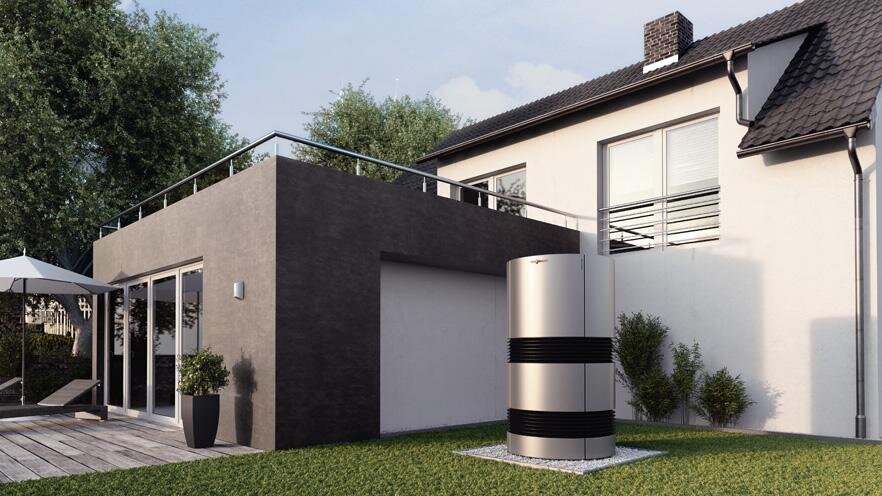
Renewable Solutions
Air source heat pumps
Heat pumps are the perfect renewable energy solution for a variety of homes and businesses.
Air source heat pumps extract renewable energy from the ambient air and efficiently convert it to heat your property and hot water, in an efficient and sustainable way. Not only will they reduce your energy bills but also significantly reduce your carbon footprint, as air source heat pumps provide a very economical heating solution.
Air source heat pumps still require electricity to run, typically around 25% because they are harnessing renewable heat energy from the air. Therefore electricity input is vastly reduced and is far less than the heat output, which makes them very efficient and consequently why they have an A+++ energy rating. However it’s worth calculating the annual electricity usage of a heat pump in comparison to your current system, to see if it’s a viable option.
Considerations.
They are designed to provide a consistent stable heat at lower temperatures, over a long period of time, hence to compensate for this the emitters (radiators) may need to be upsized. Unlike traditional forms of heating that run at much higher temperatures and are less efficient to run.
If the air source heat pump is part of a retrofit installation, it’s worth considering whether to upgrade the insulation to maximise the performance, as we would always advise the fabric first approach.
Equally air source heat pumps are the perfect solution for new builds and modernisation projects. As they can be designed to work in harmony with low temperature emitters such as underfloor heating.
Amazingly air source heat pumps are capable of operating at temperatures as low as -15, and are therefore able to effectively provide year round heating.
Coupled with solar thermal, additional savings can be made for hot water systems, which then an estimated 75% of heating and hot water requirements can be generated from renewable energy from the environment.
How do they work.
Air source heat pumps use a similar principle as a refrigerator just in reverse, which provides the highest energy efficiencies.
The evaporator harnesses heat energy from the surrounding air, by forcing the liquid refrigerant to convert into a gas. The compressor increases the pressure, this process then produces heat and in turn a high pressure hot gas. This heat is exchanged to the heating system via the condenser, to be utilised in heating the property/building, as the exchange takes place the gas condenses, and releases its latent heat. The gas condensates back to a liquid, and the ’vapour compression’ cycle starts all over again.
Pros of air source heat pumps:
Lower energy bills
Reduced carbon footprint
Less maintenance and high longevity of approximately 20-25 years
Alleviates space that would be required for alternative fuel storage. Eg. oil or LPG.
Sustainable production of heating and hot water
Clean, emission free and environmentally friendly
Extremely high efficiencies for heating a swimming pool in the summer
Cons of air source heat pumps:
Higher installation costs than other current options
Suitable external location required for the heat pump
Noise consideration, however most modern units are vary quiet
Some possible disruption upgrading the current heating system pipework and emitters
Internal space for a hot water cylinder is required
Not suitable for all lifestyles and demands
Energy content is the lowest during the winter when there’s the highest heating demand

Solar thermal
Reduce your energy bills utilising a sustainable renewable energy source that harnesses the heat from the sun, whilst lowering your carbon footprint.
Solar thermal heating is compatible with a variety of heating applications to provide year round domestic hot water.
The latest advanced technologies have designed solar collectors that are aesthetically pleasing, whilst providing maximum efficiency, reliability and performance echoed with a consistently high thermal output.
Peak solar thermal output occurs during the warmer summer months albeit the latest panels utilise direct and indirect sunlight. This is to compensate for areas with lower intensities and duration of sunlight or even cloudier days, and an orientation that's not directly south facing.
Coupled with a highly efficient insulated hot water cylinder, solar thermal hot water systems offer an efficient method of free hot water.
Typically a solar thermal system can save up to 60% on your annual energy bills, by lowering your overall energy consumption.



